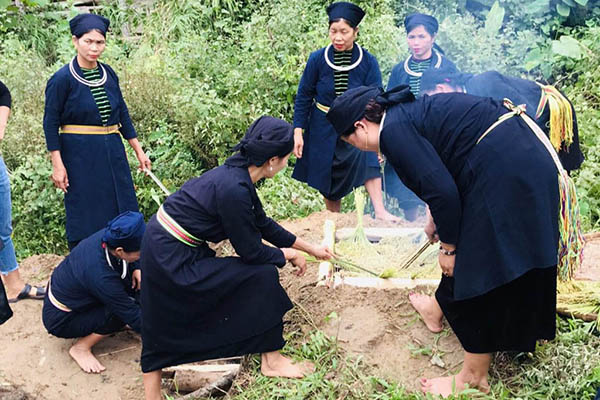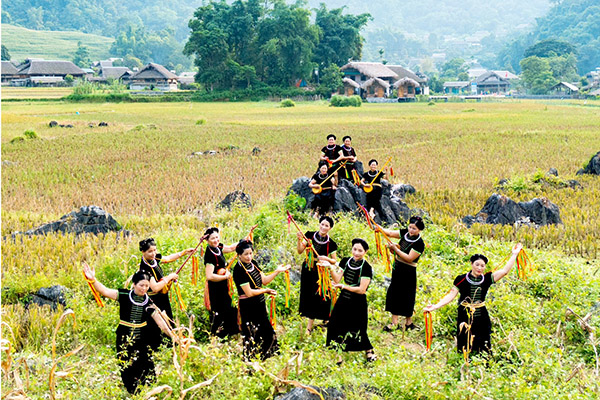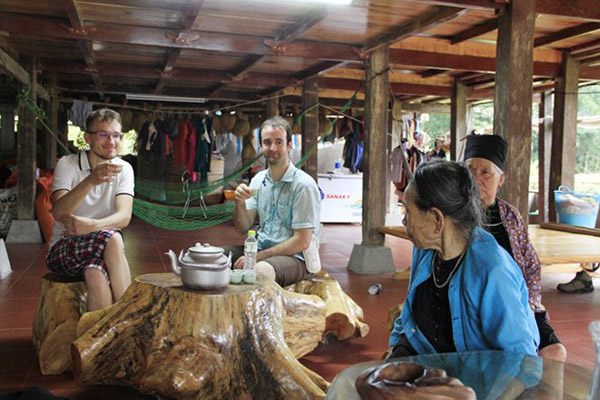Half-day / Full-day / 2-Day Experience
No Cancel
1 person
English
Tucked away in the verdant valleys of Hà Giang province, Tha Village is a hidden gem where time seems to slow down. The moment you visit rice fields Tha village, you’re transported into a tranquil world shaped by centuries of tradition, the rhythmic cycle of rice cultivation, and the hospitality of the indigenous Tày people.
This immersive experience invites travelers not just to observe but to become a part of daily life—from planting rice seedlings with bare hands to sharing a meal with local farmers after a day’s work in the fields.
Farming and animal husbandry play a crucial role in the daily lives of the Tày people in Bản Tha, providing both sustenance and economic stability. These traditional practices have been passed down through generations, maintaining a harmonious relationship with nature while ensuring food security for the local community.
Crop Cultivation
Agriculture in Bản Tha revolves around wet rice farming, which is the staple food of the Tày people. The village is surrounded by lush rice paddies, where farmers cultivate two rice crops per year using traditional methods, including manual plowing with buffaloes and organic fertilization. In addition to rice, they also grow corn, beans, sweet potatoes, and a variety of vegetables.
Terrace farming is practiced on hillsides to maximize land use, especially for crops that require well-drained soil. Villagers also plant bamboo, fruit trees, and medicinal herbs, which contribute to both household consumption and local trade.
Livestock Rearing
Animal husbandry is an integral part of village life. Households commonly raise buffaloes, cows, pigs, chickens, and ducks.
Sustainable Practices & Community Involvement
The people of Bản Tha follow eco-friendly farming methods, relying on natural fertilizers like compost and manure rather than chemical inputs. They practice crop rotation and intercropping to maintain soil fertility and prevent pests. Livestock waste is also recycled into organic fertilizer, ensuring a sustainable agricultural cycle.
Farming and animal husbandry are not just economic activities but also serve as a cultural identity of the Tày people. Many families engage in community-based farming, where neighbors help each other during planting and harvesting seasons.
Visitors to Bản Tha can experience hands-on farming activities, such as planting rice, feeding animals, or learning traditional farming techniques, offering an authentic insight into rural life in northern Vietnam.
Located near Hà Giang city, Tha Village is inhabited primarily by the Tày ethnic group, one of Vietnam’s oldest and most culturally rich communities. With its stilt houses, lush fields, winding irrigation streams, and mountainous backdrop, Tha Village offers a postcard-perfect escape for those yearning to reconnect with nature and tradition.
Farming is the backbone of Tha Village’s economy and cultural identity. When you visit rice fields Tha village, you’ll learn that wet rice cultivation isn’t just agriculture—it’s an inherited way of life, deeply entwined with local festivals, spiritual beliefs, and communal harmony.
Each season paints the rice fields in different hues:
No matter the month, choosing to visit rice fields Tha village guarantees a memorable experience steeped in natural beauty and cultural learning.
The heart of this activity is the immersive walking tour through the expansive rice fields. Accompanied by a local guide, you’ll traverse narrow dikes, cross bamboo bridges, and learn the intricacies of rice cultivation, including soil preparation, planting, water management, and harvesting.
One of the highlights when you visit rice fields Tha village is the chance to roll up your sleeves and join the villagers in their daily farm work. Depending on the season, you may:
You’ll also have the opportunity to sit down with the local Tày people and hear their stories. These interactions give you a deeper appreciation for the resilience and simplicity of rural life. Sharing a meal, tasting homegrown produce, or learning how to cook Tày dishes are priceless moments that define the essence of cultural travel.
In Tha Village, agriculture isn’t just physical labor—it is spiritual. Before each planting season, the villagers perform rituals to honor the land and pray for good weather and bountiful harvests. During your visit rice fields Tha village journey, you may witness:
These traditions have been passed down through generations and are a profound reflection of Tày identity.
Another cultural layer you’ll experience is the architecture. Stilt houses constructed from bamboo, palm leaves, and wood dot the rice field edges. Built to resist flooding and keep cool in summer, these homes are emblematic of the community’s adaptation to its environment.
When you visit rice fields Tha village, you’ll quickly notice that most farming here is organic and sustainable. The locals use:
This responsible approach to farming helps preserve the ecosystem while producing healthier crops.
An intricate system of hand-dug irrigation channels diverts fresh mountain water to the paddies. These channels are shared by the community, reflecting the spirit of cooperation that governs village life.
By choosing to visit rice fields Tha village, you experience a full day filled with hands-on activities, nature immersion, and cultural exchange.
To make the most of your trip, consider these seasonal highlights
Regardless of the season, the decision to visit rice fields Tha village will provide a unique look into the agricultural calendar of the Tày people.
You can book this immersive experience through HaloTrips or local eco-tourism partners in Hà Giang. Packages may include:
Prepare for comfort and participation:
When you choose to visit rice fields Tha village, you’re not just ticking off a sightseeing destination—you’re engaging in meaningful, community-based tourism. Your participation helps:
It’s a slow travel experience that leaves you changed, informed, and inspired.
In a world of fast-paced tours and crowded attractions, choosing to visit rice fields Tha village is a rare and refreshing alternative. It’s a return to simplicity, community, and sustainability. You’ll not only witness but take part in a time-honored lifestyle that few get to experience firsthand.
Whether you’re a cultural traveler, photographer, eco-tourist, or simply someone seeking serenity – Tha Village welcomes you with open arms and golden fields.
Don’t just dream about adventure – live it with Halo Trips! Book your Tour today and experience Vietnam’s most breathtaking landscapes, rich ethnic culture, and thrilling mountain roads – all with expert guides by your side.
👉 Limited spots available – reserve your seat now and let the journey begin!
🔗 Book Now with Halo Trips – Your adventure awaits.

⏰ 8:00 AM / 2:00 PM – Welcome & Introduction
⏰ 8:30 AM / 2:30 PM – Hands-on Farming Activities
⏰ 10:00 AM / 4:00 PM – Animal Husbandry Experience
⏰ 11:00 AM / 5:00 PM – Wrap-up & Cultural Exchange

(Combine half-day program with additional experiences) ⏰ 12:00 PM – Traditional Lunch at a Local Homestay
⏰ 2:00 PM – Afternoon Activities
⏰ 5:00 PM – Closing & Departure

✅ Suitable for all ages, including families, students, solo travelers, and cultural enthusiasts. ✅ No prior farming experience is required—local guides will assist you.
🎒 Comfortable clothes (that can get dirty) & sturdy shoes. 🧢 Hat, sunscreen, and insect repellent for outdoor activities. 📷 Camera/phone for capturing the beautiful countryside. 💧 Water bottle to stay hydrated.
🌱 Seasonal activities include:
🏡 Yes! Visitors can stay in Tày traditional homestays, enjoy local cuisine, and experience nighttime cultural performances like Then singing and folk dancing.
📅 Yes, but specific activities depend on the season:
⏳ Options available:
📌 Yes, advance booking is recommended, especially during peak seasons (harvest time, festivals). 📌 Private and group tours can be arranged.
🌿 By joining this activity, you directly support local farmers and artisans. You can also:
Buy handmade Tày textiles or bamboo crafts.
Opt for homestay lodging instead of hotels.
Share your experience to promote sustainable tourism in Bản Tha.
🌍 Authentic experience – Live and work like a local farmer. 🛤 Scenic location – Surrounded by lush rice fields & tranquil nature. 🎶 Cultural immersion – Meet the Tày people, hear their music, and taste their food. 💚 Eco-friendly tourism – Learn about sustainable farming methods.
Leave a review